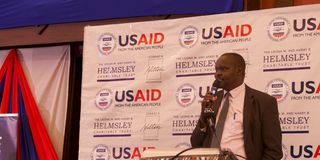USAID project to improve water quality in Naivasha

From left to right: Dr. Peace Musonge Program Manager – The Aquaya Institute, Dr. Nelson Maara, Water County Executive Committee Member (CECM), Abraham Serem – Water CECM Uasin Gishu County, Vicky Liyai, Senior Program management specialist - USAID and Rosemary Rop Water CECM for Kericho County.
Nakuru county stands to benefit from the Real Water project set to be supported by the Water quality assurance fund.
The program which is a partnership between Aquaya institute and United States Agency for International Development (USAID) will be completed in 2026.
The project will ensure individuals sourcing their water from small rural water systems can get access to clean water, which has been declared safe for consumption after undergoing tests in certified water quality assurance laboratories.
Speaking during the event, Nakuru county, Water County Executive Committee Member (CECM), Dr. Nelson Maara revealed that Nakuru is a water scarce county, noting that most of its water is sourced from the neighbouring county including Nyandarua, Kiambu, Bomet and Kericho.

Water CEC Nelson Maara.
"Despite having plenty of water sources, these counties cannot sustain the population here. This project comes at a good time to boost the water quality in the rural areas, being that most of the water systems might be community managed and not under our water service provider (WSP) Nakuru Rural Water and Sanitation Company Limited (NARUWASCO)" he says
In addition, Maara says it is important for the water quality to be tested on a monthly basis citing the geographical nature of Nakuru may make the water susceptible to pollution.
"Agricultural chemical pollutants, underground seepage, surface runoff among other factors may heavily pollute water making it unsafe for consumption. Therefore, there is need to get our water tested and treated before it is put to use," he explained
In an interview with Mtaa Wangu, Program Manager at The Aquaya Institute Dr. Peace Musonge says the project has been implemented in Ghana and is currently bring replicated in Kenya, Uganda and Tanzania.
Giving an example with Naivasha as a place with high fluoride levels in water, Dr Musonge explains that the program would look into collecting evidence of water samples from this area and advice the county government of Nakuru on how to reduce the fluoride and make water safe for drinking.
"The World Health Organization (WHO) recommended the limit of fluoride in drinking water is 1.5 mg per litre, whereas Naivasha by itself records 26 mg per litre."
